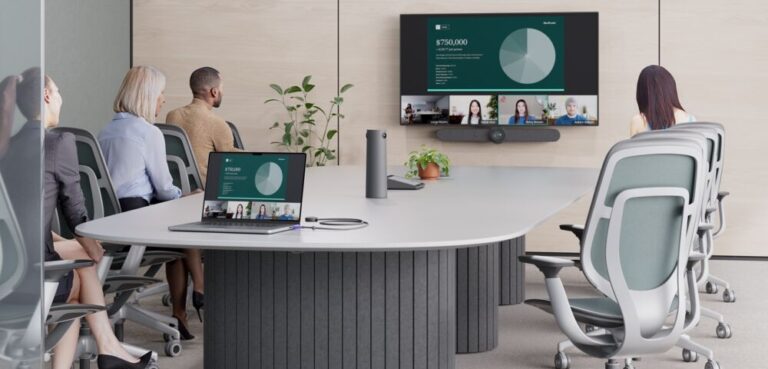
As companies navigate the complexities of return-to-office (RTO) mandates, James Campanini, Head of Logitech for Business, discusses a key challenge that is often overlooked: the readiness of office spaces to accommodate a full workforce in today’s hybrid-first era.
The debate over whether to return to the office or sustain a remote team has become one of the most significant workplace discussions in recent years. Companies are struggling to balance remote and in-office work, yet strict return-to-office (RTO) mandates are failing to deliver the intended results. While many assume the COVID-19 pandemic was the advent of hybrid work models, in reality, many businesses had already begun adopting flexible work arrangements before the pandemic accelerated the shift to remote working.
For over five years, most offices have not had to accommodate a full workforce on a daily basis. Designed for a pre-digital era, many spaces no longer meet the needs of today’s employees. Instead of encouraging engagement, outdated environments are fuelling frustration and resistance, undermining the very goals RTO policies aim to achieve.
The modern workplace is falling short
While 9 in 10 UK workers are now subject to RTO mandates, data suggests that many aren’t actually making it back in full force. In fact, commuter numbers to major towns dropped by 7% in 2024 compared to the previous year, highlighting a disconnect between employer expectations and employee behaviour. Many office spaces were designed before today’s flexible, hybrid work culture took hold, leaving employees returning to outdated or overcrowded environments that no longer meet their needs. This makes in-office work less appealing and less practical.
For employees used to remote autonomy, the transition back is proving difficult. A staggering 68% of remote workers resist RTO mandates, with inadequate office environments cited as a major factor. Rather than encouraging engagement, these outdated spaces cause frustration, pushing talent toward companies that offer greater flexibility and smarter workspace design.
Rather than addressing these shortcomings, many businesses are doubling down on mandates, expecting employees to return to offices that no longer serve them. If these spaces remain outdated, workers will continue to resist, favouring remote work where they can be more productive. Hybrid work isn’t going away, and companies that fail to adapt risk alienating employees rather than driving collaboration and innovation.
Employee expectations have shifted
Despite popular belief, hybrid work is not a new phenomenon. Even before the pandemic, many organisations had adopted flexible work arrangements. What has changed, however, is the way employees now perceive work-life balance and productivity. The forced shift to remote work during Covid reshaped expectations, making flexibility a non-negotiable rather than a perk. UK companies are struggling to revert to pre-pandemic office norms, as employees resist the push for full-time office attendance.
The problem is that many workplaces have not evolved to reflect these new realities. Rather than rethinking office design and work culture, they have treated RTO mandates as a silver bullet, thinking that simply bringing employees back will boost collaboration and innovation. However, this overlooks the major undertaking required to make in-office work effective. Rigid RTO policies are not a quick fix for company success; without adapting office spaces and workplace structures to support flexibility, these mandates risk being counterproductive. As a result, many businesses are finding that enforcing attendance alone does little to drive the engagement and productivity they were hoping for.
Creating workspaces for a hybrid future
To make RTO policies effective, companies need to be focusing on meaningful workplace transformation. Offices should be built around a hybrid-first model, with spaces that work for both in-person and virtual collaboration. This means incorporating dedicated quiet zones, adaptable set ups, and strategically placed collaborative spaces to help mitigate distractions and allow employees to work more effectively.
Equally important is investment in technology. Seamless integration between in-office and remote work ensures that all employees, regardless of location, can fully participate in meetings and daily operations. 52% of hybrid workers feel poor office technology has contributed to workplace inefficiencies. Without the right digital infrastructure, collaboration becomes more complicated, making hybrid work feel more like an obstacle than an advantage. Businesses need to prioritise technology that not only facilitates connectivity but also streamlines workflows.
Beyond technology, companies should be prioritising employee well-being by providing ergonomic workstations, implementing smart systems to manage air quality and temperature, and introducing policies that promote a balanced work experience. A well-designed office should not only encourage productivity but also enhance overall job satisfaction.
Forcing employees back into outdated office spaces is not the solution to hybrid work challenges. The goal should not be to fill desks but to create workspaces that enhance collaboration, engagement, and productivity. By taking a hybrid-first approach and designing offices that genuinely support employees, businesses can ensure that their RTO strategies lead to success, rather than frustration. The office needs to be a destination, not a requirement, and employees should feel that coming into the office is valuable, not an obligation. Providing spaces that encourage collaboration, innovation, and social connection will naturally result in in-office attendance, rather than mandating it.

